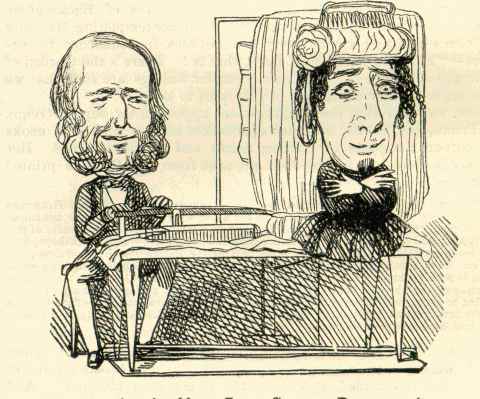
Phonozoic Text Archive, Document 123
The Speaking Machine
Punch, Volume 11 (July-December 1846), p. 83.
Attributed to
William Makepeace Thackeray
WE have been greatly edified by examining the Euphonia, or Speaking Machine, recently brought to this country by its inventor, PROFESSOR FABER.
By intense patience, and an ingenious union of wind and India-rubber, the Professor has succeeded in inventing an instrument, not, as yet, certainly, complete, but in all respects remarkable; and which, combined with other well-known mechanical inventions, may produce very wonderful results, and a great saving of labour.
There is, for instance, the Verse-grinding Machine, exhibited last year. Combined with the Euphonia it might be made to produce an extemporaneous poet who would throw MR. SLOMAN, the English Improvisatore, into the shade; and might be taught to recite with advantage in the houses of the nobility and gentry.
Combined with MR. BABBAGE's Calculating Machine, the Euphonia might replace, with perfect propriety, a Chancellor of the Exchequer, or a Mathematical Lecturer at the Universities.
Or let us suppose it united with some such instrument as the machine shown at the Society of Arts, which composes and sets up types for the press; and, instead of composing a column of type, it were to decompose or spell the same:--as one part of the compound instrument perused each syllable, the phonic part would give it utterance; and thus, by the aid of a simple grinder at the bellows, long speeches might be uttered with all the best benefits of emphasis and oratory, without a Scotch accent like LORD BROUGHAM's, or a high key like MR. SHIEL's, or a conventicle twang like SIR ROBERT's.
A parson might set up the Compound Machine in his pulpit, and a clerk or curate work it from the reading-desk, whilst his Reverence was smoking his pipe in the vestry; or an under-secretary might set the bellows going with a speech of LORD JOHN's, whilst his Lordship was taking his usual glass of brandy-and-water at BELLAMY's; or a lawyer in full practice might set a score of them to work, and so actually attend twenty committees at a time; or it might be placed upon THE THRONE, with the august insignia laid upon the top of the machine, and the LORD CHANCELLOR (after kneeling profoundly) might pop the royal speech into the proper receptacle and blow it out again to both Houses in the best style.
A clear saving of ten thousand a year might be effected by setting up a machine en permanence in the Speaker's chair of the House of Commons. Place the mace before it. Have a large snuff-box on the side, with rappee and Irish for the convenience of Members, and a simple apparatus for crying out "Order, order," at intervals of ten minutes, and you have a speaker at the most trifling cost, whom SIR WILLIAM GOSSETT might keep going all night.
The elocution of the Euphonia is not at present very distinct--say about as clear as that of HIS GRACE THE DUKE OF WELLINGTON. When people are not kindly warned beforehand of the words that the instrument is about to enunciate, they are generally so stupid as not to understand what it says. In our presence the Euphonia gave vent to a sentence which nobody understood but ourselves, and our hearts perhaps divined the cry. It was, "HOURRAH FOR FIGDORIA." So the machine (a German instrument) pronounced the venerated name of HER MAJESTY.
The Machine laughs--but we are bound to say not in a hearty and jovial manner. It is a hard, dry, artificial laugh; such as that of young Misses on the stage, when they give the genteel comedy-giggle; or of SIR ROBERT PEEL, when he is amused by some of MR. DISRAELI's good-natured jokes against him.

By the way, why should not LORD GEORGE BENTINCK have one of these machines constructed, with a BENJAMIN DISRAELI figure-head, and play upon it himself at once, and spare the honourable Member for Shrewsbury the bother of being his Lordship's Euphonia?
By far the best part of the Euphonia is its hiss; this is perfect. And perhaps the fact suggests to the benevolent mind the moral that hissing is the very easiest occupation of life,--which truth is, however, beside the present question.